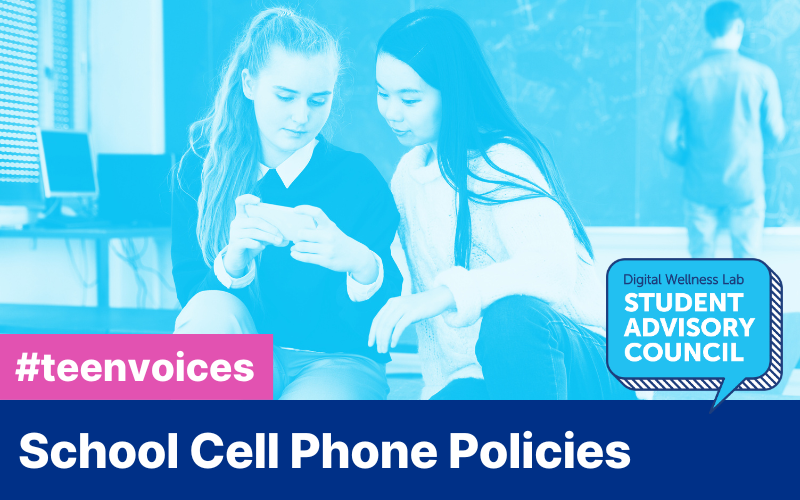In today’s digitally saturated world, cell phones are a central part of teens’ lives, particularly for high school students. However, managing their use in schools is a nuanced challenge influenced by diverse policies and viewpoints. To understand how teens view this issue, we brought the topic to our 2024-2025 Student Advisory Council at their first meeting of the school year — here’s what they had to say:
Current Cell Phone Policies: A Mixed Bag
Despite some schools having established policies, the enforcement often depends on individual teachers. Council members felt this inconsistency leads to confusion and frustration among students, and indicated a desire for a more unified approach across classrooms.
“At our school, cell phones are to be “off and away” from the moment the doors open until the end of the school day. This rule is generally respected by students, especially given that teachers have the authority to confiscate phones when they see students breaking the rules. Often, students find small windows, such as a 10-minute break, to check their messages or texts. Unfortunately, this has led to incidents where phones were taken away for seemingly benign reasons, like checking a calendar.”
“Our school does provide some allowances during ‘passive periods,’ though this varies greatly across different classrooms.”
“Some teachers strictly require phones to be in backpacks during class, while others permit their use in study halls. This inconsistency can create confusion, making it challenging to understand what is expected in any given class.”
“At the start of each class, students are required to deposit their devices in ‘cell phone hotels’ – designated caddies, which also serve as a method for teachers to take attendance.”
“My school uses Yondr pouches to track devices, but it feels like it hasn’t made a huge difference in school life.”
“While we have a policy to minimize distractions, there are instances where loopholes exist – such as using magnets to open Yondr pouches which everyone knows about.”
“My school has a big focus on individual freedom so there is not a super strong cell phone policy, but new rules have been added each year since I started.”
“There is a cell phone policy in the district, but it’s not enforced in school.”
“Our school doesn’t have a policy, and students can use phones during class.”
Phones as a Social Anchor
Council members shared that cell phones serve as a lifeline for many students, connecting them to friends and family. In high-pressure environments, such as schools, these devices offer a vital sense of security and comfort.
“Adults don’t really realize how little control kids have over their lives. When you’re at school, you’re not with your core people. And the phone is our tie to those members of our community, family, people. Phones are a security of sorts — both socially and in case of an emergency.”
“(My) school’s cell phone policy allows usage during lunch, which raises eyebrows since lunch is typically seen as a vital social time. Oddly enough, freshmen are restricted from using their phones during their first semester but can use them freely in the second.”
“After the pandemic everyone was really used to communicating online (social media or on games) so it felt really normal and natural, and there were more people on their phones when they came back to school.”
“I forgot my phone at home today, and I found it really difficult to be at school without it.”
“At my school, phones are seen as a “safe zone” — people will have the itch to use it when they feel uncomfortable socially.”
Debating Classroom Use
One of the debates among the Council members was whether completely banning phones is an effective solution. Many argued that it won’t resolve underlying issues, especially since students also have access to laptops. Others felt that moderate use of phones can enhance learning and should not be completely restricted.
“Policies have gotten stricter over time and we’re worried how extreme it might get.”
“In my school, complete bans are seen as harsh, extreme and unforgiving especially if we need to contact family/peers during the day.”
“We don’t dispute there are benefits from having phones put away during class including: less distractions, more focus and attention and a cut down on cheating.”
“I find it hard not to have my phone at school because of using interactive learning platforms (e.g., Kahoot, Quizlet, etc).”
“AI has contributed to more academic dishonesty and this is perhaps why some students want their phones during class, but that needs to be addressed in a different way.”
“Our school has Go Guardian online monitoring on ChromeBook but it can’t really track the phone so that’s maybe where some of the cell phone policies came from to curb that use on assignments and tests.”
“It seems teachers are straying away from using devices in their class, but this doesn’t feel like it’s the most effective stance. There has to be a better integration of the digital world into the classroom.”
A Call for Balanced Policies
Council members participating in this discussion found it encouraging when school administrators took the time to consider student input when developing policies, indicating that a balanced approach, one that respects both the educational environment and students’ social needs, may be the most effective way forward. By understanding the multiple roles cell phones play in teens’ lives, educators can create policies that foster both focus and flexibility.
A school’s cell phone policy reflects the challenges students face today — an ongoing experiment in balancing individual freedoms with the collective need for focus and learning. The conversation is far from over, but we believe that by involving students in the discussion, schools can refine their approaches to better serve everyone involved.
Here at the Lab, we welcome different viewpoints and perspectives. However, the opinions and ideas expressed here do not necessarily represent the views, research, or recommendations of the Digital Wellness Lab, Boston Children’s Hospital, or affiliates.








